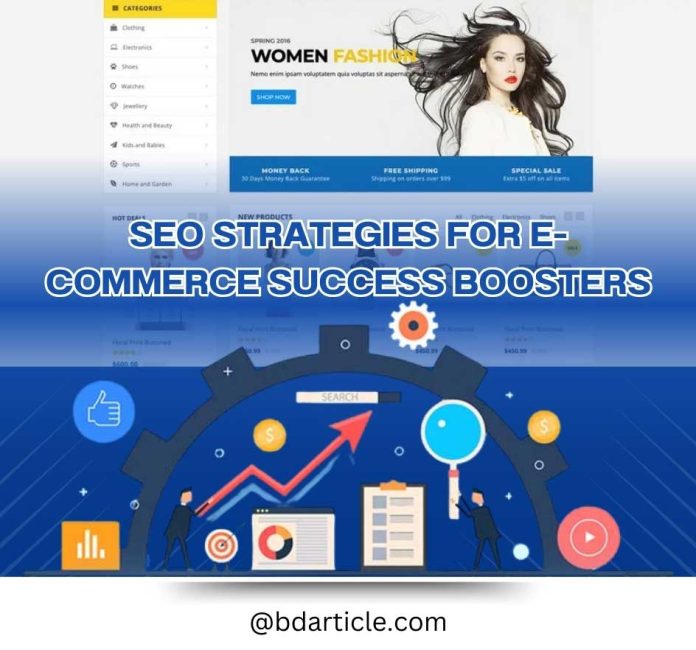SEO Strategies for E-commerce Websites
In the highly competitive realm of online retail, effective SEO strategies for e-commerce websites can be the difference between obscurity and profitability. From optimizing product pages to leveraging specialized SEO tools, there are numerous ways to enhance the visibility and success of your online store. This guide will delve into essential tactics, practical tips, and advanced techniques to ensure your e-commerce platform thrives in the digital marketplace.

Understanding the Importance of SEO for E-commerce
SEO is critical for e-commerce businesses. Without it, your site might remain invisible to potential customers searching for products like yours. SEO strategies for e-commerce websites help improve your store’s ranking on search engines, thereby increasing organic traffic, driving sales, and ultimately boosting revenue. The importance of SEO extends beyond just search engine rankings; it enhances user experience, builds brand credibility, and fosters customer loyalty.
Building a Solid SEO Foundation
A strong foundation is crucial. This involves ensuring your website is technically sound, fast, and mobile-friendly. Google’s algorithms favor websites that offer a seamless user experience, so optimizing your site’s speed, ensuring it’s mobile responsive, and using HTTPS are essential steps. Tools like Google’s PageSpeed Insights can help identify areas for improvement.
Keyword Research and Optimization
Effective keyword research is the backbone of any successful SEO strategy. Utilize tools like Google Keyword Planner, Ahrefs, or SEMrush to identify relevant keywords and phrases your potential customers are searching for. Focus on both short-tail and long-tail keywords to capture a broad audience. For instance, while “shoes” is a short-tail keyword, “best running shoes for flat feet” is a long-tail keyword that could attract more targeted traffic.
On-Page SEO for E-commerce Product Pages
Optimizing product pages is a critical component of SEO strategies for e-commerce websites. Ensure each product page is unique, with descriptive and keyword-rich titles, meta descriptions, and headers. High-quality images, detailed product descriptions, and user reviews also contribute to better rankings. Implementing structured data, such as schema markup, can enhance your product listings on search engine results pages (SERPs).
Creating High-Quality Content
Content is king in the world of SEO. Blogging about relevant topics, creating how-to guides, and sharing customer stories can drive traffic and engage your audience. Content marketing also helps in building backlinks, which are crucial for improving your site’s authority and ranking. Remember, the content should be informative, engaging, and tailored to your target audience’s needs and interests.
Leveraging E-commerce SEO Tools
Various tools are available to assist with your SEO efforts. Platforms like Moz, Ahrefs, and SEMrush offer comprehensive solutions for keyword research, backlink analysis, and site audits. Additionally, e-commerce-specific tools like Plug-in SEO for Shopify or Yoast SEO for WordPress can simplify the optimization process and ensure your site adheres to best practices.
Technical SEO for E-commerce Sites
Technical SEO involves optimizing your site for search engine crawling and indexing. This includes creating an XML sitemap, ensuring a clean URL structure, and using canonical tags to prevent duplicate content issues. Additionally, implementing breadcrumb navigation can improve site usability and search engine crawling.
Local SEO for E-commerce Businesses
If you operate both online and offline, local SEO is vital. Ensure your business is listed on Google My Business, and keep your NAP (Name, Address, Phone number) consistent across all online platforms. Encourage satisfied customers to leave positive reviews and use local keywords to attract nearby customers.
SEO for E-commerce Platforms: Shopify and WooCommerce
Different e-commerce platforms have unique SEO needs. For example, Shopify SEO involves optimizing theme settings, using apps like SEO Manager, and ensuring clean URL structures. WooCommerce, on the other hand, benefits from plugins like Yoast SEO, which provide robust optimization features. Understanding the nuances of your chosen platform can significantly impact your SEO success.
Mobile SEO for E-commerce Websites
With the increasing number of consumers shopping on their mobile devices, mobile SEO is more important than ever. Ensure your site is mobile-friendly by using responsive design, optimizing images, and simplifying navigation. Google’s Mobile-Friendly Test can help determine if your site meets mobile optimization standards.
Boost Beginner Success with Content Marketing Tools
Content marketing is a powerful tool for driving traffic and sales. Beginners can boost success with content marketing tools like BuzzSumo for content ideas, Grammarly for writing assistance, and Canva for creating visually appealing content. Consistently producing high-quality content can establish your brand as an authority in your niche and attract a loyal customer base.
Link Building for E-commerce Sites
Building high-quality backlinks is a cornerstone of effective SEO strategies for e-commerce websites. Focus on acquiring links from reputable sites in your industry, guest blogging, and creating shareable content. Tools like Ahrefs can help identify backlink opportunities and track your link-building progress.
Social Media and SEO Synergy
While social media signals do not directly impact SEO, a strong social media presence can drive traffic and enhance brand visibility. Share your content across platforms like Facebook, Instagram, and Twitter to reach a broader audience and attract potential backlinks. Engaging with your audience on social media also helps build brand loyalty and trust.
Utilizing Analytics and Monitoring Tools
Regularly monitoring your SEO efforts is essential to understand what’s working and what needs improvement. Tools like Google Analytics, Search Console, and Ahrefs provide valuable insights into your site’s performance, user behavior, and keyword rankings. Use this data to refine your strategies and stay ahead of the competition.
E-commerce SEO Checklist
To ensure you cover all aspects of SEO, create a comprehensive checklist. Include tasks like keyword research, on-page optimization, technical SEO, content creation, and link building. Regularly review and update your checklist to stay aligned with the latest SEO best practices and algorithm updates.
Benefits of SEO for E-commerce
Investing in SEO offers numerous benefits for e-commerce businesses. Improved search engine rankings lead to increased organic traffic, higher conversion rates, and better ROI. Additionally, SEO helps build brand credibility, enhances user experience, and provides a competitive edge in the crowded online marketplace.
SEO Challenges for E-commerce Sites
Despite the many benefits, SEO for e-commerce comes with its challenges. These include managing duplicate content, handling large product catalogs, and keeping up with algorithm changes. Staying informed and adaptable is key to overcoming these obstacles and maintaining a strong online presence.
Advanced SEO Strategies for E-commerce
Advanced strategies like voice search optimization, artificial intelligence, and machine learning can offer significant advantages for those looking to improve their SEO efforts. Implementing AI-powered tools for personalization and predictive analytics can enhance user experience and improve conversion rates.
E-commerce SEO Agencies and Courses
If managing SEO in-house is overwhelming, consider partnering with an e-commerce SEO agency. These agencies offer specialized expertise and resources to drive your SEO efforts. Alternatively, investing in an e-commerce SEO course can equip your team with the knowledge and skills needed to implement effective strategies.
Future Trends in E-commerce SEO
The world of SEO is constantly evolving. Future trends include the rise of visual search, the increasing importance of video content, and the growing role of artificial intelligence. Staying ahead of these trends and adapting your strategies accordingly will be crucial for long-term success.
Conclusion
SEO strategies for e-commerce websites are multifaceted and require a comprehensive approach. By focusing on keyword research, on-page and technical SEO, content creation, and link building, you can improve your site’s visibility and drive sales. Leveraging tools and staying informed about industry trends will ensure your e-commerce business remains competitive in the ever-changing digital landscape.
External Links:
#SEO_strategies_for_e_commerce_websites #E_commerce_SEO_checklist #SEO_for_ecommerce_websites

